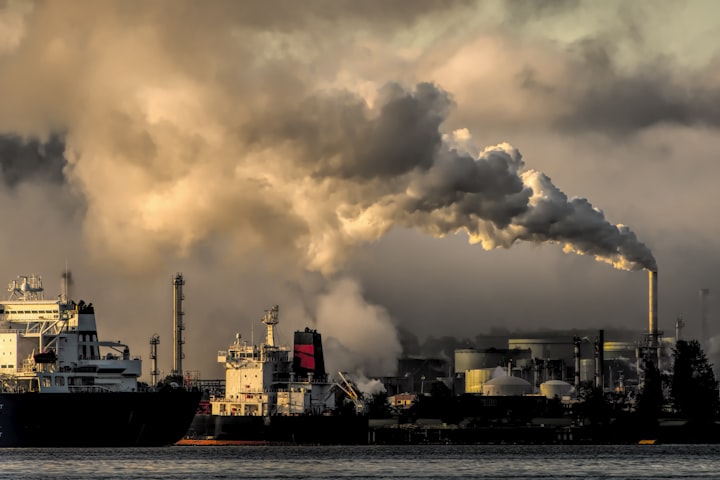The Last Oasis, Life by the Shore.
The human impact: consequences of global warming caused by fossil fuel emissions

In a small coastal town, nestled between towering cliffs and azure waters, lived a community that thrived off the bounty of the sea. The villagers, led by Emma, had forged a deep connection with their environment. For generations, they relied on fishing as their main livelihood and took pride in living in harmony with nature. Each day brought new adventures as families sailed into the horizon, casting their nets and sharing stories of triumphs and challenges.
But beneath the surface of their idyllic existence lurked an invisible threat – global warming fueled by rampant fossil fuel emissions. As temperatures soared, so did the anxieties of the villagers. The once-rich fishing grounds grew barren; fish populations dwindled as warming waters disrupted their habitats.
Emma's husband, Tom, was among the first to notice these changes. With each empty net he hauled from his boat, frustration etched deep lines across his face. Their family's future teetered on uncertainty as they struggled to make ends meet.
The destructive consequences of global warming intensified with every passing season. Storms grew fiercer and more frequent; rising sea levels encroached upon land that had once been home to generations of families.
One fateful night, a catastrophic storm struck with unparalleled fury. Wind battered villages along the coast while rain lashed against fragile structures like relentless tears from above.
Emma's heart pounded in her chest as she clung to her children amidst rising floodwaters that consumed everything in their path. Her eyes searched for Tom among panicked voices and flailing arms but found only despair.
Days turned into weeks as rescue efforts waned and hope faded like distant memories swallowed by despair. Emma's family was among many who found themselves displaced – refugees within their own country.
The government provided temporary shelters where families huddled together for warmth while grief washed over them like relentless waves crashing upon distant shores.
As Emma watched her children struggle to adjust to this new reality devoid of familiar comforts and security,
she felt herself drowning in sorrow that weighed heavier than any ocean she had ever known.
In this dark abyss emerged sparks of resilience within Emma's community—their shattered spirits slowly pieced back together. United through shared pain and loss, they began forging a new path forward—a path where reliance on fossil fuels became synonymous with destruction.
They formed alliances with environmental activists, pushing for renewable energy sources while raising awareness about global warming's devastating impact on vulnerable communities worldwide.
They refused to let tragedy define them; instead, they channeled heartache into determination—fueling a fire within themselves that burned brighter than any sun-kissed day lost to history.
Through years filled with tireless advocacy efforts, Emma saw glimpses of change—promises made transformed into tangible actions. Renewable energy initiatives sprouted across her country; fishing communities were given support to diversify livelihoods beyond an unpredictable ocean.
Though scarred by loss, Emma looked at her children playing along revived shores—flushed cheeks glowing under golden sunsets—and felt seeds of hope sprouting anew within her soul.
The road ahead remained long, but united voices carried strength untapped before; a shared commitment toward nurturing earth back from its brink bound them together—an unwavering resolve not just for survival but also for creating a sustainable future—a future built upon lessons learned from past mistakes—a future where love for our planet triumphed over short-sighted ambitions, and humanity could thrive alongside nature once more.
Individuals and governments both have crucial responsibilities when it comes to addressing global warming . Let's take a closer look at the roles each party plays in this important issue.
Individual Responsibility:
Awareness and Education: Individuals need to educate themselves about the causes and consequences of global warming. Understanding how their personal actions contribute to greenhouse gas emissions is essential.
Reduce Carbon Footprint: Taking steps to reduce individual carbon footprints can have a significant impact. This includes conserving energy, using public transportation or carpooling, adopting energy-efficient practices at home, and embracing sustainable lifestyle choices.
Promote Renewable Energy: Individuals can advocate for renewable energy sources by supporting clean energy initiatives, investing in solar panels or wind turbines, and demanding that their electricity providers offer green alternatives.
Consumer Choices: Making informed consumer choices can also make a difference. Opting for eco-friendly products, reducing waste through recycling and reusing materials, and supporting companies with sustainable practices are effective ways individuals can contribute.
Government Responsibility:
Policy Implementation: Governments play a crucial role in combating global warming by implementing policies that promote emission reductions from fossil fuels. This includes setting emissions targets, establishing carbon pricing mechanisms, providing incentives for renewable energy adoption, and enforcing regulations on industries to limit greenhouse gas emissions.
International Cooperation: Governments should actively participate in international climate change summits like the United Nations Framework Convention on Climate Change (UNFCCC) conferences to collaborate with other nations in developing solutions collectively.
Research Funding: Governments should allocate resources towards research and development of clean technologies as well as improve understanding of climate change impacts on local levels.
Support Transition Efforts: Governments must support communities heavily reliant on fossil fuels by facilitating the transition towards cleaner alternatives through job training programs, infrastructure investments in renewable energy projects, and supporting economic diversification.
The collective efforts of individuals adopting sustainable lifestyles alongside governments implementing effective policies are crucial for tackling global warming caused by rampant fossil fuel emissions effectively. Both parties must work together towards a more sustainable future to mitigate the impacts of climate change for generations to come.
About the Creator
Christabel Appiah kusi
I am forever a student. The world, my greatest teacher, and I am constantly learning, evolving, pushing the boundaries of my creativity. This path is paved with both triumph and doubt, but the fire within keeps me chasing the next sunrise.





Comments (1)
Heart touching story... Great work🙏👍